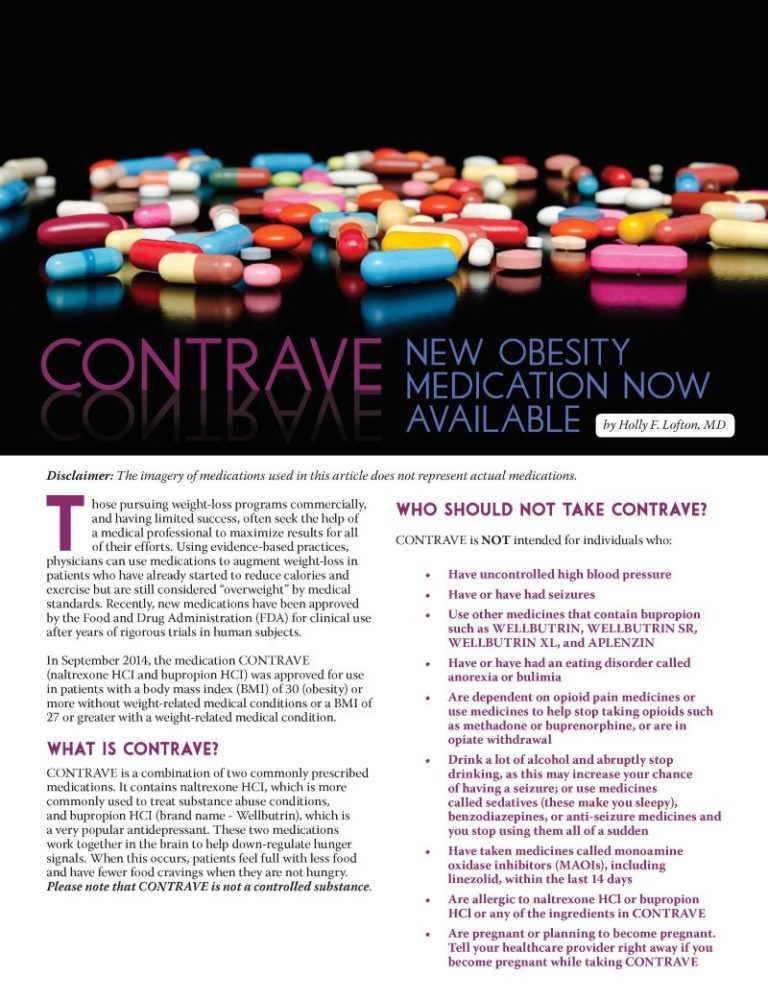CONTRAVE – New Obesity Medication Now Available


by Holly F. Lofton, MD
Winter 2015
Disclaimer: The imagery of medications used in this article does not represent actual medications.
Those pursuing weight-loss programs commercially, and having limited success, often seek the help of a medical professional to maximize results for all of their efforts. Using evidence-based practices, physicians can use medications to augment weight-loss in patients who have already started to reduce calories and exercise but are still considered “overweight” by medical standards. Recently, new medications have been approved by the Food and Drug Administration (FDA) for clinical use after years of rigorous trials in human subjects.
In September 2014, the medication CONTRAVE (naltrexone HCI and bupropion HCI) was approved for use in patients with a body mass index (BMI) of 30 (obesity) or more without weight-related medical conditions or a BMI of 27 or greater with a weight-related medical condition.
What is CONTRAVE?
CONTRAVE is a combination of two commonly prescribed medications. It contains naltrexone HCI, which is more commonly used to treat substance abuse conditions, and bupropion HCI (brand name – Wellbutrin), which is a very popular antidepressant. These two medications work together in the brain to help down-regulate hunger signals. When this occurs, patients feel full with less food and have fewer food cravings when they are not hungry. Please note that CONTRAVE is not a controlled substance.
Who should NOT take CONTRAVE?
CONTRAVE is NOT intended for individuals who:
- Have uncontrolled high blood pressure
- Have or have had seizures
- Use other medicines that contain bupropion such as WELLBUTRIN, WELLBUTRIN SR, WELLBUTRIN XL, and APLENZIN
- Have or have had an eating disorder called anorexia or bulimia
- Are dependent on opioid pain medicines or use medicines to help stop taking opioids such as methadone or buprenorphine, or are in opiate withdrawal
- Drink a lot of alcohol and abruptly stop drinking, as this may increase your chance of having a seizure; or use medicines called sedatives (these make you sleepy), benzodiazepines, or anti-seizure medicines and you stop using them all of a sudden
- Have taken medicines called monoamine oxidase inhibitors (MAOIs), including linezolid, within the last 14 days
- Are allergic to naltrexone HCl or bupropion HCl or any of the ingredients in CONTRAVE
- Are pregnant or planning to become pregnant. Tell your healthcare provider right away if you become pregnant while taking CONTRAVE
For these reasons, it is extremely important that you disclose all of your medical history and current medications prior to being prescribed CONTRAVE. It is also important to note that CONTRAVE can cause a false-positive urine drug screen for amphetamines.
How does CONTRAVE work to produce weight-loss?
The first component of CONTRAVE, naltrexone HCI, is an opioid antagonist. This means it blocks the center in the brain where opiate-like medications bind. The second component, bupropion HCI, helps keep the levels of dopamine and norepinephrine slightly higher in the central nervous system. CONTRAVE is believed to work on the hypothalamus (appetite regulatory center) and dopamine reward system in the brain to regulate appetite.
What can I expect when my doctor prescribes CONTRAVE?
- The dosing of CONTRAVE changes weekly for the first month. It increases gradually from one tablet by mouth in the morning the first week, to the final dose of two tablets twice daily in the fourth week on the medication.
- It is recommended to take the medication with a meal, though one should avoid taking the medication with a high-fat meal as the absorption will not be ideal.
- Your doctor will likely ask you to monitor yourself for common side effects such as nausea, constipation and headache and to report if you experience any of these. As well, your doctor will monitor your weight, blood pressure, and heart rate when you follow-up in the office.
Since most patients on CONTRAVE lost weight in the first 12 weeks, your doctor will check on your weight-loss on the medication at 12 weeks and possibly prior to this time to determine if CONTRAVE is effective for you and should be continued.
How much weight-loss is expected if I take CONTRAVE?
While every individual is unique, it is reassuring to know that any medication you take has been tested in trials that have included a vast number of patients from various backgrounds. In the trials of CONTRAVE, 4,536 patients from four different institutions were tested. All were given counseling on reducing calories, exercising, and adapting behaviors and a medication to take. Some patients were given CONTRAVE and others received a placebo (pill with no medication). After 56 weeks, the patients who received placebo had lost 1 percent of their initial weight (i.e. this is the weight-loss produced from the counseling), while the patients who took CONTRAVE lost 5 percent of their weight.
To put this in perspective, in a 200-pound person, 1 percent weight-loss is two pounds and 5 percent is 10 pounds lost. While these numbers may seem low, it has been well-recognized in the medical weight-loss community that 5 to 10 percent weight-loss can significantly decrease risk of diabetes and other weight-related conditions.
Are there safety concerns with CONTRAVE?
Because it contains bupropion HCI, CONTRAVE has a boxed warning to alert healthcare professionals and patients to the increased risk of suicidal thoughts and behaviors associated with antidepressant drugs. The warning also notes that serious neuropsychiatric events have been reported in patients taking bupropion for smoking cessation.
Bupropion HCI has been shown to cause seizures in the past, so the medication is not recommended in those with increased risk of seizures, who use alcohol or sedatives in excess. For these reasons, it is important to take the medication only as prescribed.
Is future research planned for CONTRAVE?
The FDA is requiring the manufacturer perform the following research even though the drug has been approved and is now available:
-
-
- Two studies in pediatric patients (one in patients 12 to 17 years of age, and one in patients 7 to 11 years of age)
- A study on growth and development as well as behavior, learning, and memory
- A study to evaluate the effect of CONTRAVE on the electrical activity of the heart
- Other studies are also in progress.
-
Conclusion
While the medical community welcomes these new advances in prescriptions to treat obesity and overweight, it cannot be emphasized enough that CONTRAVE and other drugs are to be used only at the discretion of a trained professional. If you feel you may benefit from a medication such as CONTRAVE, please discuss a treatment plan with your doctor. If you need help broaching the subject, you can download a FREE toolkit, produced by the Obesity Action Coalition, at www.YourWeightMatters.org.
About the Author:
Holly F. Lofton, MD, is an assistant professor of medicine and surgery at NYU School of Medicine. She treats adults affected by overweight and obesity and designed the popular New You weight-loss program for those have not been able to achieve weight-loss with conventional methods. Her primary research interests are improving nutrition and activity profiles for patients utilizing supplemental meals as well as treating those with weight regain after bariatric surgery.
by Kendall Griffey, OAC Communications Manager Spring 2024 We have officially kicked off Your Weight Matters Regional…
Read ArticleTelemedicine became a popular tool during the pandemic because it allows healthcare professionals to provide medical care…
View Videoby Kendall Griffey, OAC Staff; and Chrystal Jones, OAC Staff Fall 2022 For over ten years, the…
Read Article









